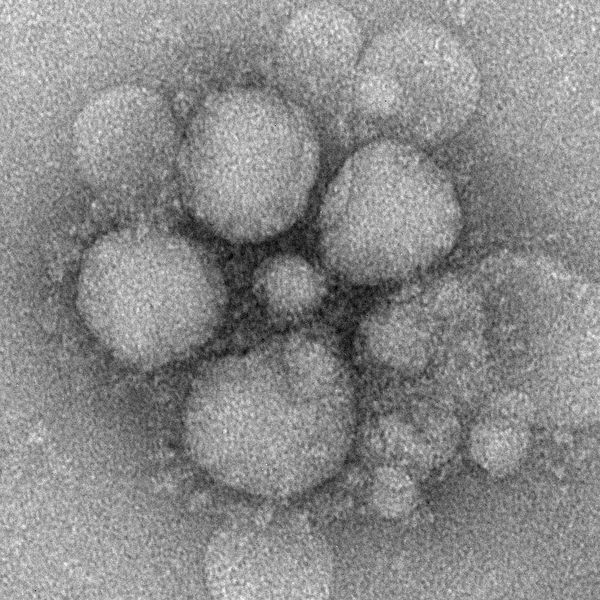
MERS-CoV particles as seen by negative stain electron microscopy. Virions contain characteristic club-like projections emanating from the viral membrane.
By : Cynthia Goldsmith/Maureen Metcalfe/Azaibi Tamin
http://www.cdc.gov/coronavirus/mers/photos.htm
Wikimedia . org
...

U.S. reports third case of MERS virus
English.news.cn 2014-05-18 07:15:58WASHINGTON, May 17 (Xinhua) -- A third case of the deadly Middle East Respiratory Syndrome (MERS) virus infection has been found in the United States, the country's Centers for Disease Control and Prevention (CDC) said Saturday.
The patient is an Illinois man who had close contact with the country's first confirmed case of MERS virus infection in Indiana and "probably got the virus from the Indiana patient," the CDC said in a statement.
The Illinois resident "did not seek or require medical care" and "is reported to be feeling well" at this time but as part of the MERS virus infection follow-up investigation of the first case, local health officials have monitored his health daily since May 3, the CDC said.
It said that the Illinois resident, who has no recent history of travel outside the United States, met with the Indiana patient on two occasions shortly before the latter was identified as having had MERS virus infection.
The Illinois man tested positive for the MERS virus Friday night, the CDC added.
The first U.S. MERS case is a U.S. resident who had traveled back from Saudi Arabia and was admitted to an Indiana hospital on April 28. He was confirmed to have MERS virus infection on May 2, and has since been released from the hospital.
A second U.S. imported case of MERS virus infection was confirmed on May 11 on a 44-year-old man who also came to the U.S. from Saudi Arabia. This patient is currently hospitalized in Florida and doing well, the CDC said.
The MERS is a virus that is new to humans and was first reported in Saudi Arabia in 2012. As of May 16, there have been 572 laboratory-confirmed cases of MERS virus infection in 15 countries with 173 deaths, the CDC said.
Most of these people developed severe acute respiratory illness, with fever, cough, and shortness of breath. Officials do not know where the virus came from or exactly how it spreads. There is no available vaccine or specific treatment recommended for the virus.
Editor: xuxin
.....
CDC: MERS virus spread in US, but 2nd man not sick
NEW
YORK — Health officials reported Saturday what appears to be the first
time that a mysterious Middle East virus has spread from one person to
another in the United States.
The Illinois man probably picked up an infection from an Indiana man who earlier this month became the first U.S. case of Middle East respiratory syndrome, or MERS. The Illinois man, however, never needed medical treatment and is reported to be feeling well, officials at the Centers for Disease Control and Prevention said.
The two men met twice before the Indiana man fell ill and was hospitalized in Munster, Indiana, shortly after traveling from Saudi Arabia, where he lived and was employed as a health care worker. Health officials say they think the virus spread during a 40-minute business meeting that involved no more contact than a handshake.
"We don't think this changes the risk to the general public," which remains low, said Dr. David Swerdlow of the CDC.
The new report also is not considered evidence that the virus is spreading more easily among people than previously thought, he said. The virus is not considered to be highly contagious, and health officials believe it only spreads from person to person with close contact. Many of those who have gotten sick in the Middle East have been family members or health care workers caring for a MERS patient.
The CDC said tests completed Friday provided evidence that the Illinois man had an infection at some point. Since the first man's diagnosis, health officials have been monitoring and testing anyone who was in close contact with him, including health care workers and household members, but none of the rest of them has tested positive for the virus.
The Illinois man probably picked up an infection from an Indiana man who earlier this month became the first U.S. case of Middle East respiratory syndrome, or MERS. The Illinois man, however, never needed medical treatment and is reported to be feeling well, officials at the Centers for Disease Control and Prevention said.
The two men met twice before the Indiana man fell ill and was hospitalized in Munster, Indiana, shortly after traveling from Saudi Arabia, where he lived and was employed as a health care worker. Health officials say they think the virus spread during a 40-minute business meeting that involved no more contact than a handshake.
"We don't think this changes the risk to the general public," which remains low, said Dr. David Swerdlow of the CDC.
The new report also is not considered evidence that the virus is spreading more easily among people than previously thought, he said. The virus is not considered to be highly contagious, and health officials believe it only spreads from person to person with close contact. Many of those who have gotten sick in the Middle East have been family members or health care workers caring for a MERS patient.
The CDC said tests completed Friday provided evidence that the Illinois man had an infection at some point. Since the first man's diagnosis, health officials have been monitoring and testing anyone who was in close contact with him, including health care workers and household members, but none of the rest of them has tested positive for the virus.
Read More Here
.....

No comments:
Post a Comment
Hello and thank you for visiting my blog. Please share your thoughts and leave a comment :)